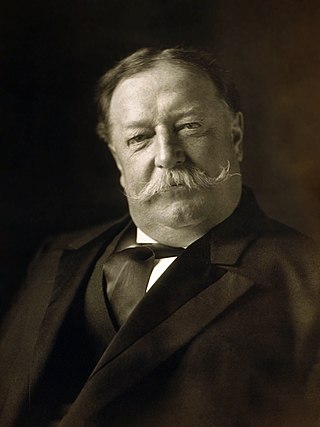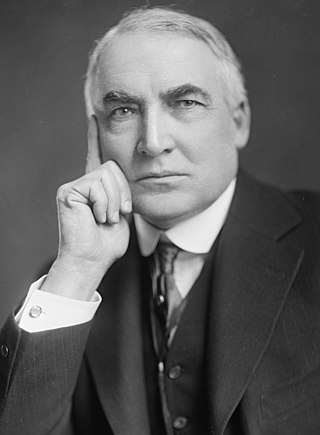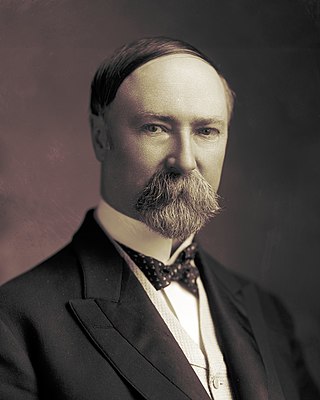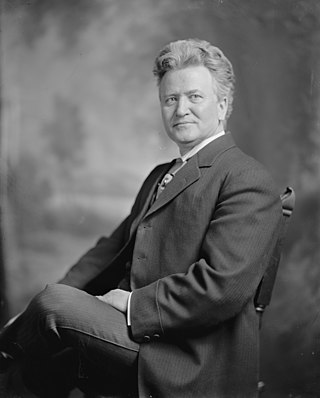
Calvin Coolidge was an American attorney and politician who served as the 30th president of the United States from 1923 to 1929.

William Howard Taft was the 27th president of the United States, serving from 1909 to 1913, and the tenth chief justice of the United States, serving from 1921 to 1930, the only person to have held both offices. Taft was elected president in 1908, the chosen successor of Theodore Roosevelt, but was defeated for reelection in 1912 by Woodrow Wilson after Roosevelt split the Republican vote by running as a third-party candidate. In 1921, President Warren G. Harding appointed Taft to be chief justice, a position he held until a month before his death.

The 1920 United States presidential election was the 34th quadrennial presidential election, held on Tuesday, November 2, 1920. In the first election held after the end of the First World War and the first election after the ratification of the Nineteenth Amendment, Republican Senator Warren G. Harding of Ohio defeated Democratic Governor James M. Cox of Ohio. It was also the third presidential election in which both major party candidates were registered in the same home state; the others have been in 1860, 1904, 1940, 1944, and 2016.

William Jennings Bryan was an American lawyer, orator, and politician. Beginning in 1896, he emerged as a dominant force in the Democratic Party, running three times as the party's nominee for President of the United States in the 1896, 1900, and 1908 elections. He served in the House of Representatives from 1891 to 1895 and as the Secretary of State under Woodrow Wilson from 1913 to 1915. Because of his faith in the wisdom of the common people, Bryan was often called "the Great Commoner", and because of his rhetorical power and early fame as the youngest presidential candidate, "the Boy Orator".

Charles Warren Fairbanks was an American politician who served as a senator from Indiana from 1897 to 1905 and the 26th vice president of the United States from 1905 to 1909. He was also the Republican vice presidential nominee in the 1916 presidential election. Had the Republican ticket been elected, Fairbanks would have become the third vice president to multiple presidents, after George Clinton and John C. Calhoun.

James Middleton Cox was an American businessman and politician who served as the 46th and 48th governor of Ohio, and a two-term U.S. Representative from Ohio. As the Democratic nominee for President of the United States at the 1920 presidential election, he lost in a landslide to fellow Ohioan Warren G. Harding. His running mate was future president Franklin D. Roosevelt. He founded the chain of newspapers that continues today as Cox Enterprises, a media conglomerate.

Hiram Warren Johnson was an American attorney and politician who served as the 23rd governor of California from 1911 to 1917. Johnson achieved national prominence in the early 20th century. He was elected in 1916 as the United States Senator from California, where he was re-elected to five terms and served until his death in 1945.

Robert MarionLa Follette Sr., was an American lawyer and politician. He represented Wisconsin in both chambers of Congress and served as the governor of Wisconsin from 1901 to 1906. A Republican for most of his life, he ran for president of the United States as the nominee of his own Progressive Party in the 1924 presidential election. Historian John D. Buenker describes La Follette as "the most celebrated figure in Wisconsin history".

Elihu Root was an American lawyer, Republican politician, and statesman who served as the 41st United States Secretary of War under presidents William McKinley and Theodore Roosevelt and the 38th United States Secretary of State under Roosevelt. In both positions as well as a long legal career, he pioneered the American practice of international law. Root is sometimes considered the prototype of the 20th-century political "wise man", advising presidents on a range of foreign and domestic issues. He also served as a United States Senator from New York and received the 1912 Nobel Peace Prize.

Philander Chase Knox was an American lawyer, bank director and politician. A member of the Republican Party, Knox served in the Cabinet of three different presidents and represented Pennsylvania in the United States Senate.

William Edgar Borah was an outspoken Republican United States Senator, one of the best-known figures in Idaho's history. A progressive who served from 1907 until his death in 1940, Borah is often considered an isolationist, because he led the Irreconcilables, senators who would not accept the Treaty of Versailles, Senate ratification of which would have made the U.S. part of the League of Nations.

William Ewart Humphrey was an American politician who served as a member of the United States House of Representatives from 1903 to 1917. He represented the state of Washington at large from 1903 to 1909 and the First Congressional District of Washington from 1909 to 1917. Humphrey also served as a member of the Federal Trade Commission from 1925 to 1933.

John James Blaine was an American lawyer and politician. He was the 24th Governor of Wisconsin and a United States senator. He also served as Attorney General of Wisconsin and a member of the Wisconsin State Senate.

The Fourth Party System was the political party system in the United States from about 1896 to 1932 that was dominated by the Republican Party, except the 1912 split in which Democrats captured the White House and held it for eight years.

Woodrow Wilson's tenure as the 28th president of the United States lasted from March 4, 1913, until March 4, 1921. He was largely incapacitated the last year and a half. He became president after winning the 1912 election. Wilson was a Democrat who previously served as governor of New Jersey. He gained a large majority in the electoral vote and a 42% plurality of the popular vote in a four-candidate field. Wilson was re-elected in 1916 by a narrow margin. Despite his New Jersey base, most Southern leaders worked with him as a fellow Southerner.

Samuel Huston "Shy" Thompson Jr. was an American lawyer and college football coach. The Princeton University graduate served as head football coach at Oberlin College in 1897, at Lehigh University from 1898 to 1899, and at the University of Texas at Austin from 1900 to 1901, compiling a career college football record of 24–18–3. He was the first head coach at Texas to return for a second season. Thompson served as assistant U.S. attorney general under President Woodrow Wilson from 1913 to 1918 and on the Federal Trade Commission (FTC) from 1919 to 1927. He was the chair of the FTC from December 1, 1920 to November 30, 1921, and again from December 1, 1923 to November 30, 1924.

William Loeb Jr. was an American political figure. He was the Presidential secretary to President Theodore Roosevelt and Collector of the Port of New York from 1909 to 1913. He was the father of William Loeb III, the conservative publisher of the Manchester Union Leader.

The Insular Government of the Philippine Islands was an unincorporated territory of the United States that was established in 1902 and was reorganized in 1935 in preparation for later independence. The Insular Government was preceded by the United States Military Government of the Philippine Islands and was followed by the Commonwealth of the Philippines.
The presidency of Theodore Roosevelt began on September 14, 1901, when Theodore Roosevelt was inaugurated as the 26th president of the United States following the assassination of William McKinley, and it ended on March 4, 1909.



















